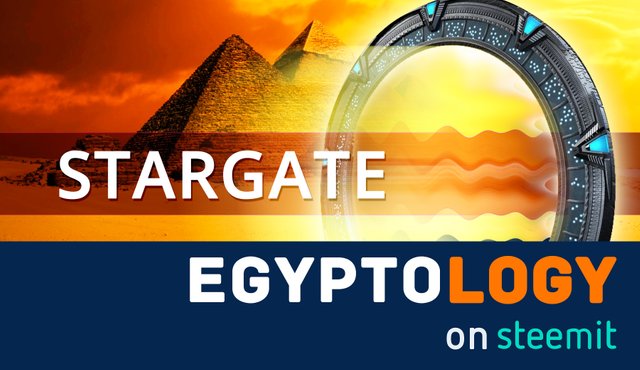
I know it is already more than a week ago since I wrote my last article here on steemit. But at the moment I am busy preparing an important research trip to the western desert in Egypt for December, on which I will take you, my dear steemit-readers, with me. You will get exclusive insights. So stay curious – it will be amazing. ;)
Today I want to talk with you about how Ancient Egypt and Egyptology as a scientific subject are percieved by movie makers and how they were influenced and advised by experts. I want to do this by referring to a very famous movie: Stargate. Most of you probably know already the great work of the director Roland Emmerich in 1994, which was adapted later by the successful Stargate series. If not, I can highly recommend the movie to you! You can watch it online on Amazon Video (see links at the bottom of this article). ;)
The Stargate Movie
Stargate tells the fictional story of an ancient artefact made of metal that was discovered accidentally during an excavation in Giza near the Pyramids in 1928. A little girl was witnessing the unearthing of that huge ring-shaped thing that had strange signs carved on its cover stones. Nobody knew at that time what it was. Please have a look at this short clip from youtube:
Today archaeological excavations are, of course, far more organized than they were in 1928, but we still see a lot of people swirling around when a new, fantastic discovery was made. But: today nobody would erect an object of this size directly before the director of the mission and the inspectors of the SCA (Supreme Council of Antiquities in Cairo) had examined it in every detail. Sometimes objects are left in the sand for further research. For example, when we find an entrance gate to an ancient city, in some cases we excavate only one half of it. The other half will remain untouched for future generations of archaeologists with new, more precise technologies. So to say, field archaeology has a destructive side, which drives us to be more sensitive regarding huge finds.
Real Historical Figures and Places
Let's go further through the movie. In the following scene after the discovery in the desert, the movie jumps to the contemporary time and we find ourselves in a lecture with Dr. Daniel Jackson explaining his progressive ideas about the real age of the pyramids. But this scene is becoming quite sad. Jackson has to go through a humiliating experience: he's getting discredited by established scientists and the audience is leaving the hall! We see him then standing alone and speechless behind his lectern, while an old woman (which is the little girl from the first scene) is witnessing him from the door.
This is a quite interesting scene not only because this is the nightmare of every Egyptologist, but we can see there a few hidden signs that prove that this movie was made with the scientific advice of ‘real’ Egyptologists.
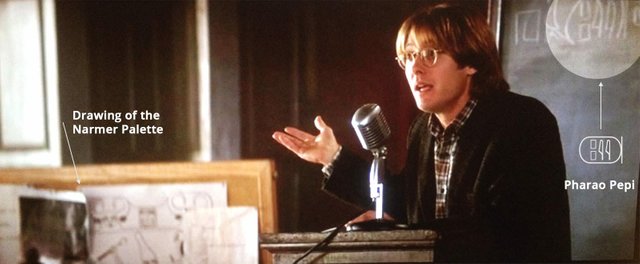
At the chalkboard behind him, you can see real hieroglyphs with the cartouche and the name of Pharao Pepi. (𓊪 𓊪 𓇌) Remark: I am writing hieroglyphs here with Unicode, which doesn't allow me to ‘pile’ the signs vertically but you can see it on the still image from the movie above how to write the Pharao's name correctly. ;)
The second hint is visible on the wooden frame next to Jackson. There is a drawing on paper fixed to the frame. This is originated from the famous Narmer Palette, today on display in the Egyptian Museum in Cairo. It shows the well-known motive of ‘The Pharao Beating The Enemy’, which I described in one of my last articles about kingship in Ancient Egypt.
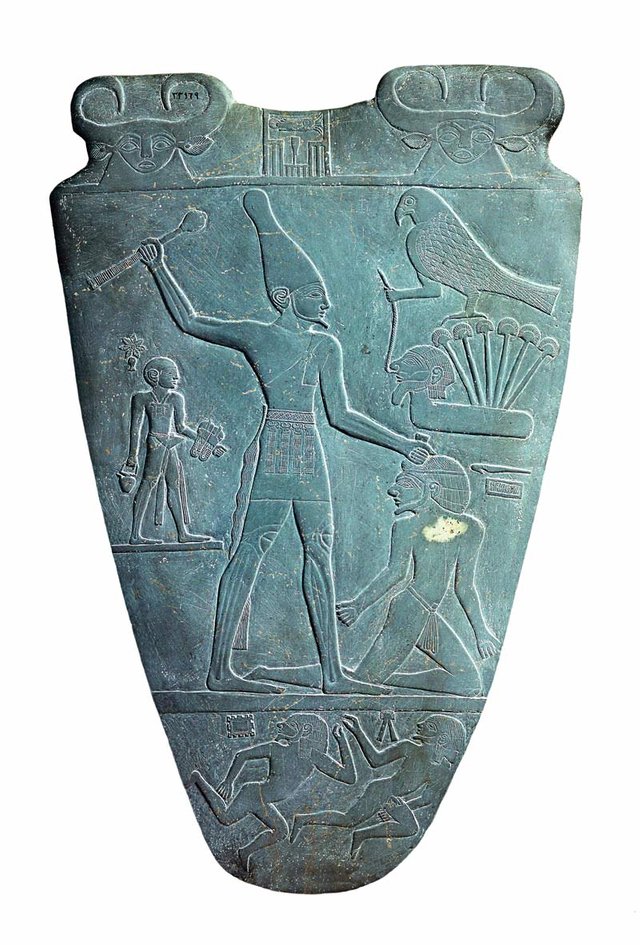
Real Hieroglyphs
Later in the movie Catherine, the old woman, reveals that she want to have Dr. Daniel Jackson in her team of specialists to solve an archaeological quest that was a long kept secret – the huge ring object from the opening scene. Shortly after, Jackson attends to a meeting in a bunker within a military area. High officials in uniform - together with Catherine – waiting for him. The situation is confusing for him. In the next scene, he is led to the artefact that is admitted to translate.

In the following, we can see again some lines of hieroglyphs on a chalkboard. These lines are written in original Egyptian language. In contrast to other movies with fantasy hieroglyphs that cannot be related to any real linguistic system and are just used in an illustrative way, these hieroglyphs in the Stargate movie are genuine! Jackson is complaining about the wrong translation based on ‘Budge’ which he is probably referring to the Egyptologist and Linguist Ernest Alfred Wallis Budge. His books are indeed a bit outdated, but let me show you how difficult it really is to find out the true meaning of Egyptian signs.
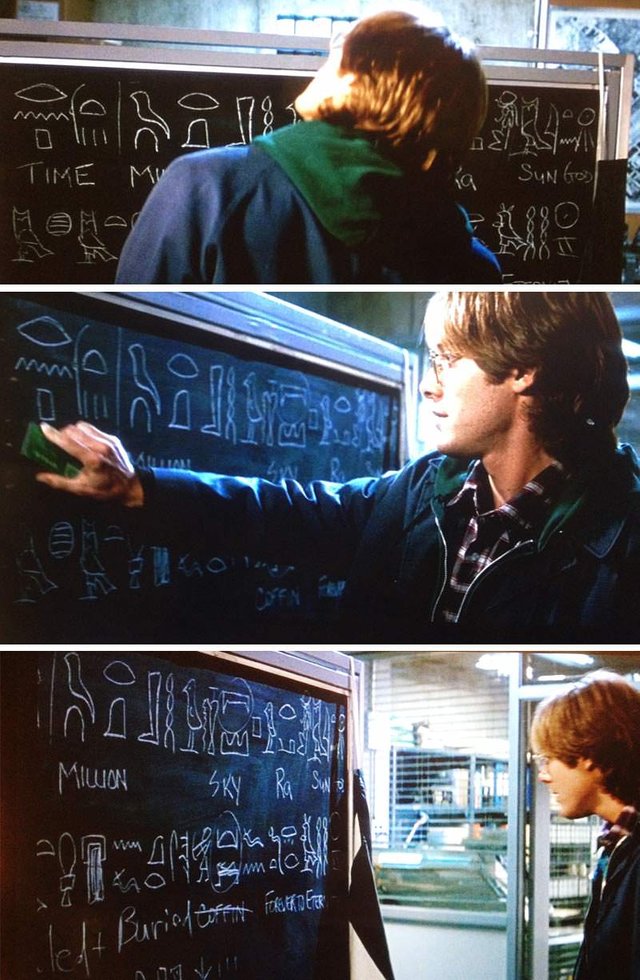
In the following, I tried to copy, transcribe and translate the hieroglyphs from the chalkboard in the movie:
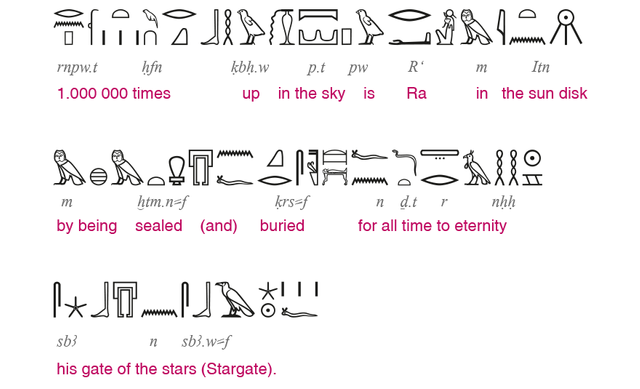
A Little Help from the Dictionary
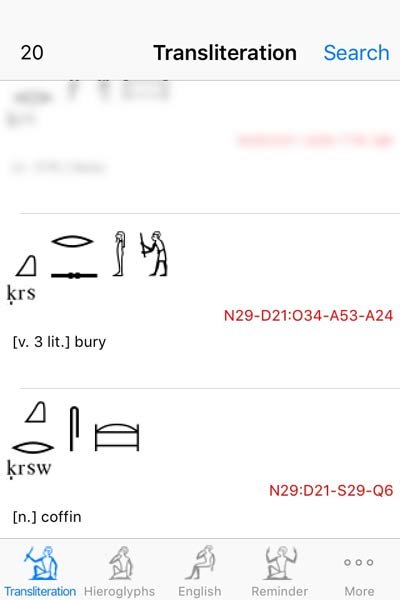
Another Funny Scene
After arriving at the other world through the stargate Jackson and his companions meet a civilization. To make a good impression Jackson is giving a chocolate bar to the leader of the tribe. He tries it, firstly hesitating, but after tasting he feels excited and comments his new experience with the words ‘bani wer’. Jackson has no clue what that means, but I have. ;)
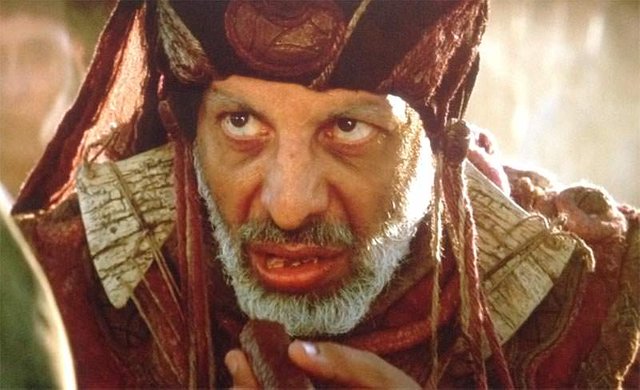
Again – We Need a Dictionary
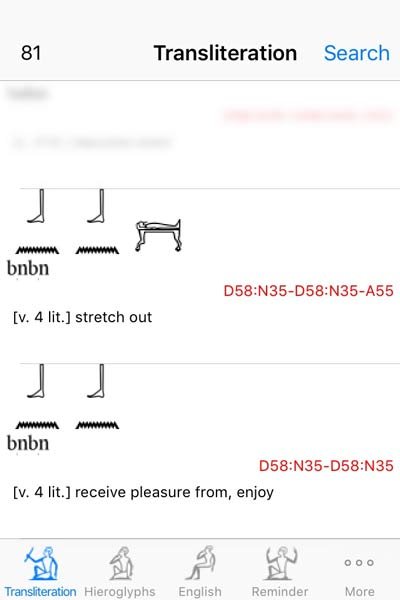
The leader of the tribes says ‘bani wer’. So the second word ‘wer’ is clearly the Egyptian wr, which mean ‘very much’. This reinforces his expression of an absolute delicious food. ;)
Egyptological Experts
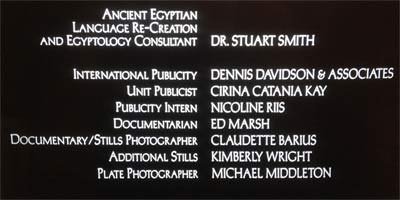
A Question of Shame and Honor
When I started my study of Egyptology at the university I got the strange feeling that the beginners were ‘scanned’ by the advanced students, if they ‘fit’ into the scientific world and if their motives for studying Egyptology are ‘down to earth’ enough. As an example, they told a ‘shameful story’ as an anecdote when a beginner once was attending a lecture and fearlessly asked, in ‘which Museum the Stargate is on display’. I really don't know if this really happened or this was just an ‘old wives tale’ to make some fun out of it, but it had a deep impact on many of the students. From that moment on, nobody would ever have the courage to ask questions in public that go far beyond our imagination. But this is probably one of the limitations of the academic education in general.
Based on this experience I always encourage students to – at least – allow themselves to think ‘out of the box’. It is a matter of personality when you have the courage to speak out your ideas, but we have to make sure that our conclusions are based on scientific research. Egyptology at universities can provide us with the necessary tools and abilities to fulfill this approach. But we always have to remember that our thoughts are free!
Summary
The Stargate movie has inspired a whole generation of Egyptologists as well as non-Egyptologists. It is a great artwork full of fantasy and amazing pictures of Egypt. But the second key scene in the beginning of the lecture hall contains a very important message, that I want to highlight here at the end of my article.
One attendee asks Jackson: ‘Well, who do you think built the pyramids?’
and he answered honestly: ‘I don't have any idea who built them.’
This is something that may leave a lot of people unsatisfied with the work of us Egyptologists, but honesty is the only thing we can prevail for ourselves in a world full of fake news. We know already much about Ancient Egypt and a lot of theories could be proven right or wrong. But sometimes we just have to admit, that we just don't know it – yet. ;)
Additional information:
Watch Stargate on Amazon
Further reading (scientific sources)
Krüger, Frederic, The Stargate Simulacrum: Ancient Egypt, Ancient Aliens, and Postmodern Dynamics of OccultureAegyptiaca, in: Journal of the History of Reception of Ancient Egypt No 1, 2017, pp.47–74.
http://www.britishmuseum.org/research/search_the_collection_database/term_details.aspx?bioId=93650
Hieroglyphs, if not written in unicode, were made with the software JSesh.
Image sources
Image used in the editorial picture Source
Still images from the movie Stargate by Roland Emmerich 1994.
Dictionary Screenshots from software Aaou (for iPhone)
Narmer Palette Source
Feel free to ask all the question of what you always wanted to know about Ancient Egypt. That’s my job and my passion. Let’s discuss your thoughts and ideas.

If you liked this article, please follow me on my blog @laylahsophia. I am a german Egyptologist writing about ancient and contemporary Egypt, history of science, philosophy and life.
I recall a controversy regarding the age of Sphinx in 1990s. A Boston University geologist and an Egyptologist contended that based upon Sphinx limestone erosion pattern, the Sphinx was much older than the academically accepted timeframe. They too were met with hostile reception and their arguments marginalized.
Downvoting a post can decrease pending rewards and make it less visible. Common reasons:
Submit
i have watched several movies and read history, one thing can say for sure that Egypt is filled with the wonders of world. Every 3rd discovery belongs to Egypt, which shows their ability in past.
note. this is only my personal point of view.
Downvoting a post can decrease pending rewards and make it less visible. Common reasons:
Submit
I'm half egyptian and the one depiction of egypt that annoys me every time is the bangles. Good post btw! Enjoyed it.
Downvoting a post can decrease pending rewards and make it less visible. Common reasons:
Submit
Thank you... I like that video! ;)
Downvoting a post can decrease pending rewards and make it less visible. Common reasons:
Submit
I love your creative putting together your profession with what else is there in the world. This time Hollywood. I saw this movie many times and back then I kind of admired the main actor. Today getting feelings of melancholy as he is so young in this movie, and so were we!
"A million times up in the sky is Ra in the sun disk by being sealed and buried for all time to eternity his gate of the stars. " - is this the right order of that sentence because looking on how you arranged it I was not quite sure?
I do not fully comprehend it but it resonates with me deeply. Maybe just because I have romance for that in my heart but maybe for other reasons I do not know.
Thank you!
Downvoting a post can decrease pending rewards and make it less visible. Common reasons:
Submit
Hey Erika, thanks for your nice comment again. 😍
Egyptian hieroglyphs are often not so easy to translate directly into our modern language since the structure of the sentences are quite different. In some cases there are even more than one variants to translate it and both of them can be correct. In this case the text is meant probably like a ‘label’ on the cover stones: "This is his gates of the stars in which Ra was buried and sealed 1 Million times". And by the way - the number 1 Million is made of the little "frog" together with the sign below it.
The frog means 100.000 and the sign below 10. So it is 10 x 100.000 = 1.000 000 Tricky, right? 😎🤩
Downvoting a post can decrease pending rewards and make it less visible. Common reasons:
Submit
Superb insight! Thank you! <3
Downvoting a post can decrease pending rewards and make it less visible. Common reasons:
Submit
Thank YOU! :D
Downvoting a post can decrease pending rewards and make it less visible. Common reasons:
Submit
No wonder archeologists would not opt to get the entire structure but instead allow future generations to use it. This is very insightful I must say and worth sharing also in prints.
Downvoting a post can decrease pending rewards and make it less visible. Common reasons:
Submit
Thank you very much. :)
Downvoting a post can decrease pending rewards and make it less visible. Common reasons:
Submit
You are welcome maam! 😁
Downvoting a post can decrease pending rewards and make it less visible. Common reasons:
Submit
Never knew Stargate was so scientific!
And you actually provided new insight into the movie with the bani wer section, and I also liked the spirit of the shame and honor section: the motives of the "shame" story were good, but it could also inadvertently lead to stifling of creative thought and questioning, and you try to mend that. Very good!
Downvoting a post can decrease pending rewards and make it less visible. Common reasons:
Submit
Thank you for reading and commenting. I really appreciate that! :)
Downvoting a post can decrease pending rewards and make it less visible. Common reasons:
Submit
Great post @laylahsophia. Thank you for sharing this article. Just followed you
Downvoting a post can decrease pending rewards and make it less visible. Common reasons:
Submit
Thank you!
Downvoting a post can decrease pending rewards and make it less visible. Common reasons:
Submit
Afwan
Downvoting a post can decrease pending rewards and make it less visible. Common reasons:
Submit